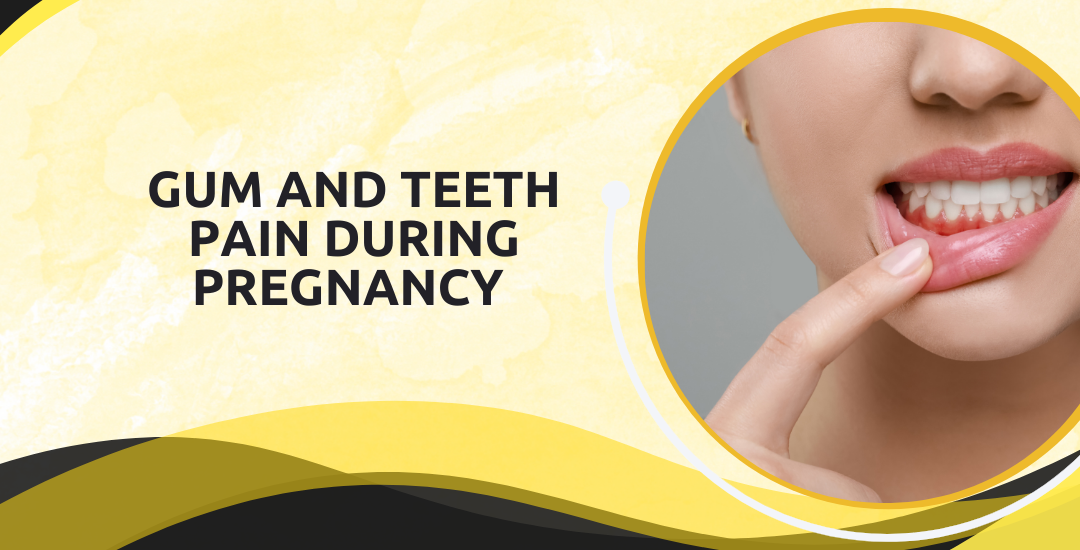Pregnancy is an exciting journey filled with changes—both expected and unexpected. One of the lesser-discussed yet surprisingly common issues faced by many expectant mothers is gum and teeth pain during pregnancy. In fact, many women experience Gum and Teeth Pain in between Pregnancy trimesters due to hormonal shifts and immune changes. If you have noticed bleeding gums, sensitivity, or sore teeth during pregnancy, you are not alone. Hormonal shifts and bodily changes can significantly impact oral health. However, with the right care, support, and knowledge, managing dental discomfort during pregnancy is absolutely possible.
Why Do Gums Hurt During Pregnancy?

Gum pain during pregnancy isn’t just a random occurrence—it is often linked to the profound hormonal changes your body is going through. Increased levels of progesterone and estrogen can cause the gums to become more sensitive to plaque, leading to inflammation and tenderness.
This condition is medically known as pregnancy gingivitis, and it can begin as early as the first trimester. Symptoms include red, swollen, and bleeding gums, especially when brushing or flossing.
According to Dr. Jahnavi Patel, a renowned dentist in South Bopal
“Pregnancy gingivitis is very common, but with proper oral hygiene and timely care, it can be managed effectively and even prevented.”
Also, some women develop a condition called a pregnancy tumor (pyogenic granuloma) on the gums. While it sounds alarming, it is benign and usually disappears after delivery. However, it can contribute to discomfort and gum pain during pregnancy.
What Causes Tooth Pain in Pregnancy?
While gum issues are more commonly talked about, many women also experience sore teeth in pregnancy. This discomfort can stem from a few causes:
- Hormonal fluctuations: Estrogen and progesterone increase blood flow, which can cause tooth sensitivity.
- Morning sickness: Frequent vomiting exposes teeth to stomach acid, leading to enamel erosion.
- Calcium deficiency: If your body doesn’t get enough calcium, it may start using your stored reserves—possibly weakening your teeth.
- Increased plaque build-up: Pregnancy alters your immune response, making it harder to fight off gum infections, which can also lead to toothache.
These combined factors make Gum and Teeth Pain in between Pregnancy more common than you might expect, even for women who previously had no dental issues. That’s why routine dental visits and enhanced oral hygiene are so crucial during this time.
Need fast and natural relief? Scroll on to find out.
Safe Home Remedies for Gum and Tooth Pain

When you are pregnant, over-the-counter medications are limited, but there are several safe and natural remedies to soothe dental issues in pregnancy:
- Warm salt water rinse: Gargling with salt water reduces inflammation and kills bacteria. Do this twice a day.
- Cold compress: Apply to the outside of your cheek for quick relief from swollen gums or toothache.
- Hydrogen Peroxide rinse (diluted): Only under a dentist’s guidance. It can combat bacteria and ease irritation.
- Clove oil dab: A traditional remedy for toothache—apply sparingly using a cotton swab.
- Good hydration: Staying hydrated promotes saliva production, which protects teeth and gums.
- Soft-bristled toothbrush: Gentle brushing reduces trauma to already-sensitive gums.
Dr. Jahnavi Patel recommends, “Stick to brushing twice daily with a fluoride toothpaste and avoid acidic or sugary foods that can worsen tooth sensitivity.”
Now you might be wondering—can you even see a dentist while pregnant? Let’s find out.
Dental Treatments That Are Safe During Pregnancy

Many dental procedures are not only safe during pregnancy but also recommended to avoid complications. Here’s what’s considered safe:
- Dental cleanings and exams: Essential to prevent gum disease.
- X-rays: Modern digital X-rays with proper shielding are safe.
- Fillings and crowns: Necessary treatments should not be delayed.
- Local anesthesia: Certain types are approved for use during pregnancy.
The second trimester is usually the best time for non-urgent dental work—you are past early development and not yet in the uncomfortable third trimester.
At Dentafix Dental Clinic in South Bopal, we take every precaution to ensure a comfortable, stress-free experience for pregnant patients.
Don’t ignore these red flags—your oral health matters now more than ever.
When to See a Dentist Immediately

Some symptoms during pregnancy require urgent dental attention:
- Persistent toothache or sensitivity
- Swelling in the face or gums
- Pus or bad taste in the mouth
- Gum abscess
- Bleeding that doesn’t stop
- Loose teeth
These may indicate a more serious infection or condition that could affect both you and your baby. Immediate treatment is essential to prevent systemic complications.
Wrapping Up
Gum and teeth pain during pregnancy might be common, but it doesn’t have to be your new normal. With expert care, a proper oral hygiene routine, and a little planning, you can keep your smile healthy for both you and your baby. Whether it’s sore teeth, bleeding gums, or general dental discomfort, don’t hesitate to seek guidance.





